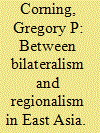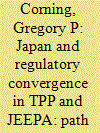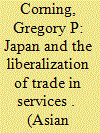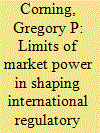| Srl | Item |
| 1 |
ID:
092137


|
|
|
|
|
| Publication |
2009.
|
| Summary/Abstract |
This paper examines economic regionalism in East Asia with a focus on the key issues in harmonizing bilateral free trade agreements. The ASEAN+1 free trade agreements with China, South Korea and Japan represent the first attempts to structure cooperation in trade across Southeast and Northeast Asia. It is therefore important to examine the coverage of these agreements and the extent to which they actually liberalize trade. This study focuses on major choices made in the negotiation of the ASEAN-Japan Comprehensive Economic Partnership Agreement and the ways in which these choices help or hinder the consolidation of economic regionalism. The results achieved in the ASEAN-Japan Comprehensive Economic Partnership Agreement are limited at best. The agreement does establish some new areas of cooperation among the signatories but fails to address important issues for regionalism such as labor mobility. It also makes limited progress in harmonizing and liberalizing rules of origin. The ASEAN-Japan Comprehensive Economic Partnership Agreement applies product-specific rules to fewer categories of goods than most of Japan's bilateral agreements with ASEAN members but those rules in place are still very restrictive. Moreover, the parties to the ASEAN-Japan Comprehensive Economic Partnership Agreement have the option of applying the rules of their bilateral agreement if it provides more favorable treatment. Thus, there is no guarantee the more liberal terms of the ASEAN-Japan Comprehensive Economic Partnership Agreement will be applied.
|
|
|
|
|
|
|
|
|
|
|
|
|
|
|
|
| 2 |
ID:
191669


|
|
|
|
|
| Summary/Abstract |
This paper compares Japan’s negotiations on regulatory convergence with the United States in the Trans-Pacific Partnership (TPP) and with the European Union (EU) in the Japan-EU Economic Partnership Agreement (JEEPA), focusing on the motor vehicle and medical device sectors. Despite the TPP being concluded first, JEEPA moved Japan closer to EU-defined or influenced standards in both sectors. This was primarily the result of path dependence created by existing interstate institutional arrangements in motor vehicles and by transnational cooperation in medical devices, rather than of the bilateral structure of the JEEPA talks producing more focused negotiating objectives and outcomes. The case studies suggest that PTAs can play a meaningful role in advancing regulatory convergence, but mostly as locking-in mechanisms for deals reached in other forums. Therefore, simultaneous PTA negotiations provide little impetus for regulatory triadic closure in the absence of a well-established path of regulatory cooperation.
|
|
|
|
|
|
|
|
|
|
|
|
|
|
|
|
| 3 |
ID:
146906


|
|
|
|
|
| Summary/Abstract |
This paper argues that political rather than economic motivations explain Japan’s approach to services negotiations but that the Trans-Pacific Partnership and Trade in Services Agreement present Japan with opportunities to advance liberalization in services as well as to pursue political gains in the competition for regional leadership with China.
|
|
|
|
|
|
|
|
|
|
|
|
|
|
|
|
| 4 |
ID:
078588


|
|
|
|
|
| Publication |
2007.
|
| Summary/Abstract |
This paper examines Japan's FTAs with Mexico and the Philippines in the context of parallel negotiations in the Doha Round. Although the limited results produced by these FTAs represent an inferior outcome to what might be achieved with multilateral trade liberalization, there is no evidence that these agreements have weakened the political will of Japanese export interests to push ahead with trade liberalization in the WTO or increased the leverage of protectionist interests in opposing that goal. The greatest hope for increased Japanese flexibility in WTO agricultural talks lies in accelerated reform of domestic farm policy rather than reduced emphasis on pursuit of FTAs.
|
|
|
|
|
|
|
|
|
|
|
|
|
|
|
|
| 5 |
ID:
160006


|
|
|
|
|
| Summary/Abstract |
What factors shape the ability of the United States to negotiate international regulatory cooperation? This paper discusses three theoretical approaches that help to explain the potential for regulatory change – market power, historical institutionalism, and loss avoidance – and applies them to the negotiation of regulatory issues in the Trans-Pacific Partnership (TPP). It seeks to understand why the regulatory disciplines in some TPP chapters were more rigorous than those in other chapters. Focusing on case-studies of the chapters on state-owned enterprises and regulatory coherence, the paper argues that the market power of the United States is more likely to secure stronger regulatory disciplines when there is: (1) a strong loss avoidance coalition in the USA pushing for change, and (2) a weakly institutionalized regulatory framework among parties in a given issue area that makes path dependence less important.
|
|
|
|
|
|
|
|
|
|
|
|
|
|
|
|